Key takeaways:
- Effective networking is about building genuine connections through open conversations and understanding others’ needs.
- Engaging with speakers and following up after interactions can lead to deeper insights and collaborative opportunities.
- Utilizing social media enhances networking by creating communities and expanding reach beyond traditional settings.
- Personalized follow-ups after events solidify connections and can lead to valuable professional relationships.
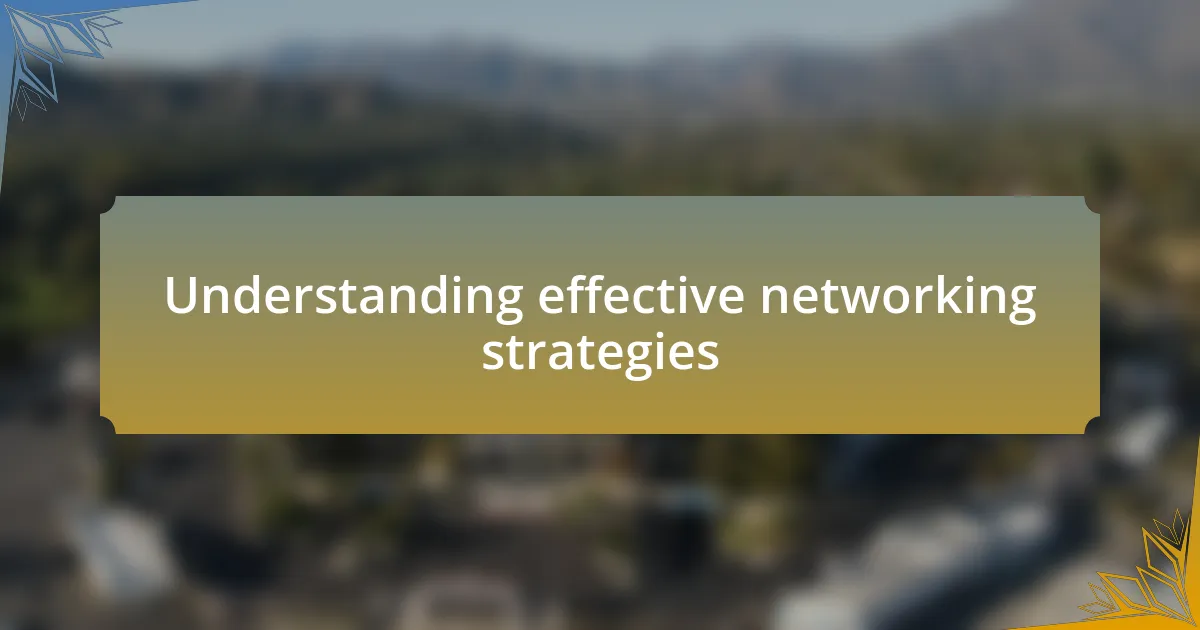
Understanding effective networking strategies
Effective networking strategies are all about building genuine connections. I remember attending a conference where I felt a bit out of place. Instead of waiting for people to approach me, I took the initiative to smile and ask open-ended questions. It transformed my experience, helping me forge meaningful relationships instead of superficial contacts.
Another critical aspect is understanding your audience. When I engaged with potential clients, I focused on their needs and interests rather than just promoting my services. Have you ever noticed how much more engaging conversations become when they are tailored to the other person? It’s that shift in focus that often leads to more fruitful exchanges.
Also, follow-up is essential. After an event, I always make it a point to reach out to the people I met, usually with a simple message to reconnect. This personal touch often leads to deeper conversations later. It’s amazing how a little effort in keeping those connections alive can open doors you never thought possible. So, how can you integrate these strategies into your own networking approach?

Importance of networking at conferences
Connecting with others at conferences is invaluable. I recall a time when I met an industry leader who later became a mentor. It was astonishing how one conversation opened doors to resources and opportunities I never knew existed. Isn’t it remarkable how a single connection can alter the course of your professional journey?
Networking is also about sharing knowledge and insights. I remember attending a panel discussion and chatting with fellow attendees afterward. We shared our thoughts and experiences, which helped me see problems in a new light. Have you ever had a discussion that changed your perspective? Those moments are pure gold at conferences.
Moreover, building relationships can enhance your visibility. I once helped a colleague by introducing them to the right people, and in return, my own reputation grew. It’s fascinating how mutual support can boost not just individual careers but also foster a sense of community. Wouldn’t you agree that creating a network of advocates can be one of the strongest assets you possess?
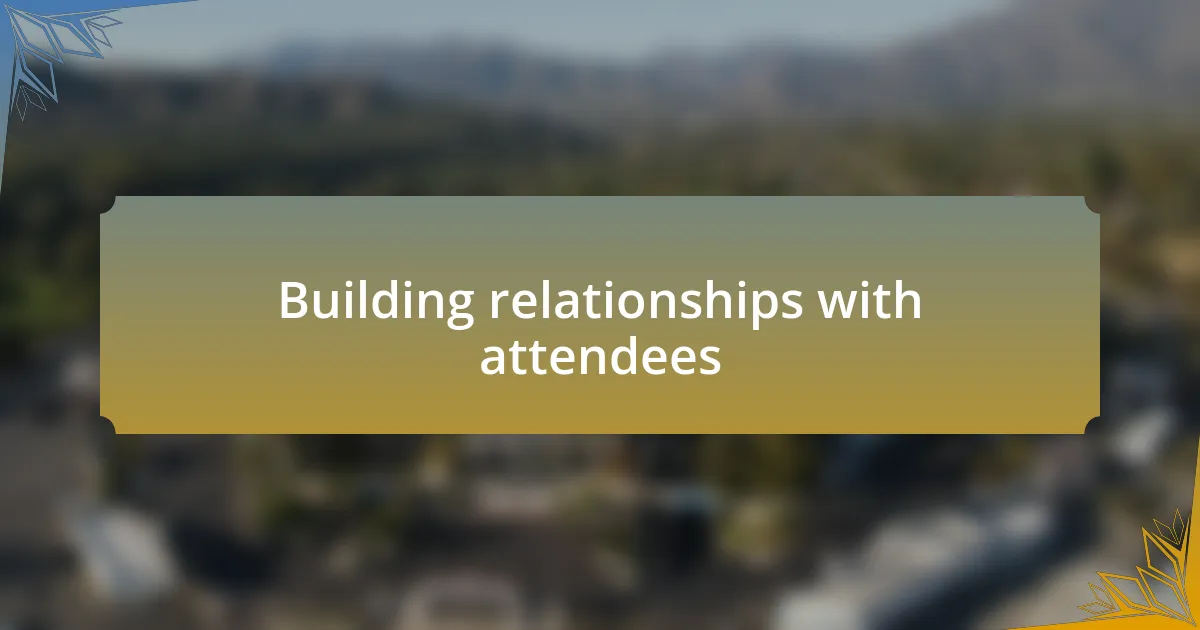
Building relationships with attendees
Building relationships with attendees starts with genuine conversation. I remember a time when I approached a fellow participant during lunch, and instead of jumping straight into business talk, we shared stories about our journey in the industry. That small shift transformed our interaction from a transactional meeting into a meaningful exchange. Isn’t it amazing how learning about someone’s passions can create a stronger bond?
Active engagement is another crucial strategy. Once, I joined a workshop and made a point to connect with others through follow-up discussions on ideas we explored. Sharing insights and asking questions not only deepened my understanding but also opened doors to collaborations I hadn’t considered before. Have you ever thought about how your curiosity can lead to lasting relationships?
Lastly, being supportive plays a pivotal role in relationship building. I still recall a moment when I offered to help a fellow attendee prep for their presentation. The gratitude expressed strengthened our connection and reinforced the idea that true networking is about giving, not just taking. Don’t you find that acts of kindness can create lasting impressions in a sea of networking?
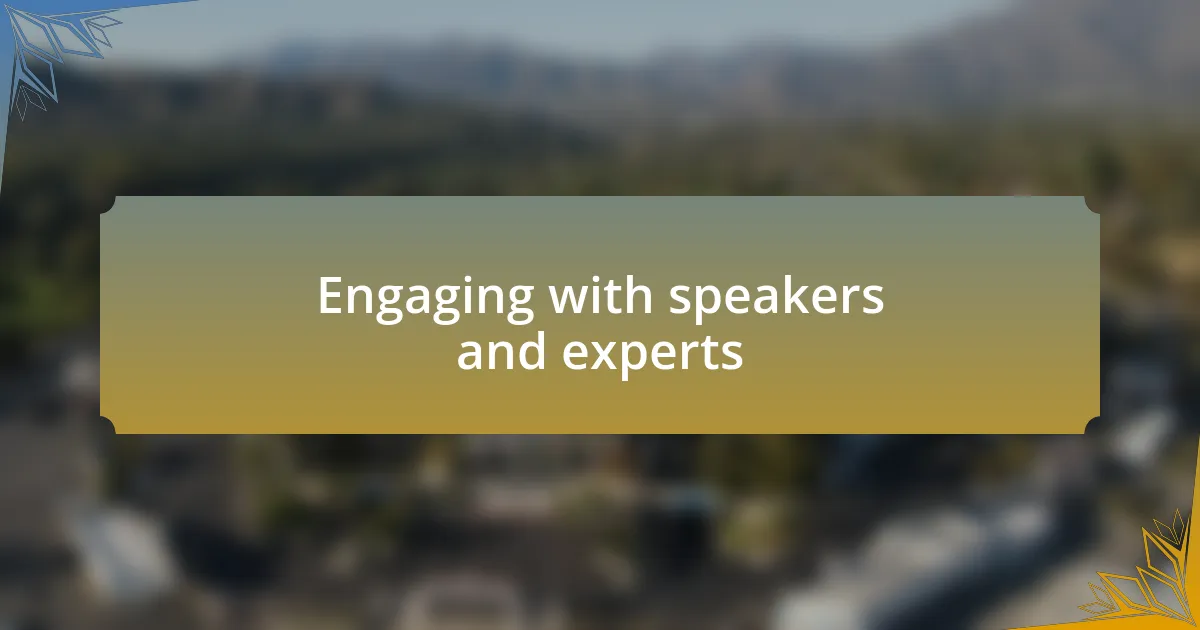
Engaging with speakers and experts
Engaging with speakers and experts can feel daunting, but I’ve found that approachability often leads to rewarding conversations. I vividly remember a time when I asked a speaker a question after their presentation, and instead of a formal response, they shared a personal story that sparked a deeper discussion. This moment made me realize that experts appreciate when you show genuine interest in their work. Have you considered how your curiosity might unlock new insights?
Taking the initiative to connect outside of the formal setting is another effective strategy. After a panel discussion, I once invited a speaker for coffee, focusing on their experiences rather than seeking immediate advice. That casual setting allowed us to explore shared interests and foster a sense of camaraderie. How many opportunities have you missed by staying within the confines of scheduled events?
Additionally, following up after the event can really set you apart. I often send a brief note or a message sharing my thoughts on their presentation and mentioning specific points that resonated with me. This simple gesture has led to continued dialogues that not only enhance my understanding of the topic but also keep the door open for future collaboration. Isn’t it fascinating how a little initiative can lead to meaningful connections?
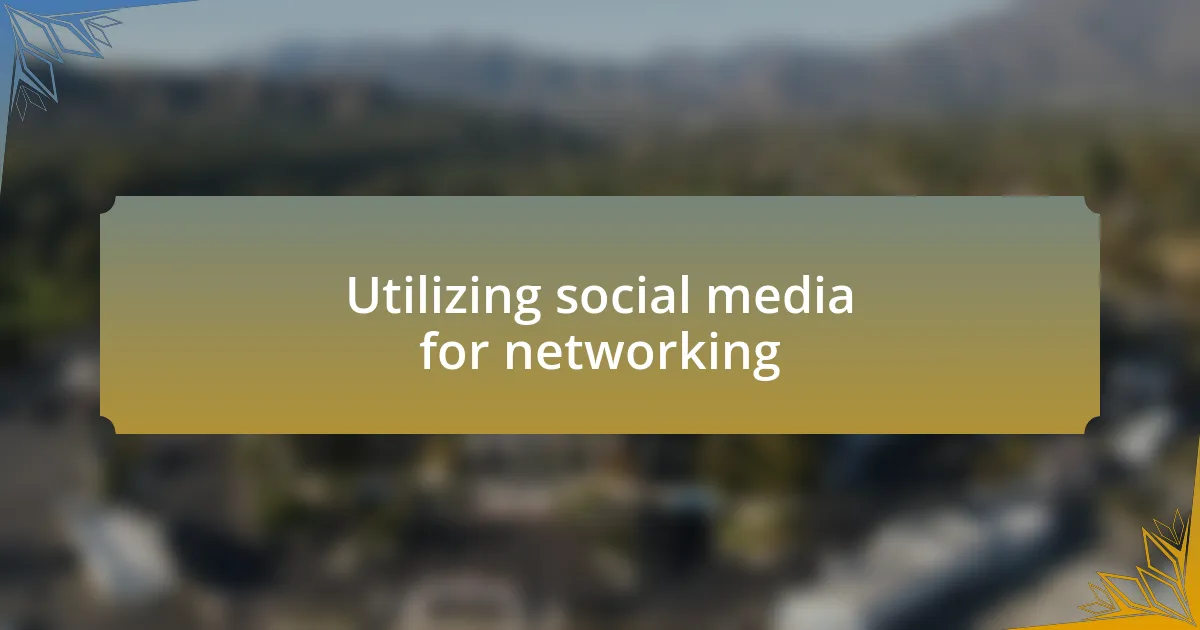
Utilizing social media for networking
Utilizing social media for networking has transformed how I connect with industry professionals. I remember a time when I tweeted a thought during a live event, and surprisingly, the keynote speaker replied directly to me. That interaction didn’t just amplify my reach; it opened a direct line of communication that led to more engaging conversations. How often do you think a single tweet could spark a valuable connection?
I’ve also found that joining LinkedIn groups specific to my interests creates a sense of community among like-minded individuals. One evening, I engaged in a discussion in a group about customer experience trends, which eventually led to a private message exchange. Those conversations not only deepened my understanding but organically created a network of professionals I now regularly consult with. Have you explored relevant groups that might enrich your networking potential?
When attending virtual conferences, I leverage social media platforms to introduce myself and connect with other attendees. I recall a moment when I shared a photo from an online session, tagging the speakers involved. This not only allowed me to express my enthusiasm but also caught the attention of attendees who resonated with my post. Suddenly, I had several new connections eager to talk about shared interests. Isn’t it incredible how social media can amplify networking efforts beyond traditional settings?

Following up after the conference
Following up after a conference is crucial for maintaining the connections you’ve made. After one particularly inspiring event, I took the time to send personal emails to speakers whose sessions really resonated with me. I expressed my appreciation for their insights and included a specific takeaway from their talk, which prompted meaningful exchanges. Have you ever noticed how a personalized touch can leave a lasting impression?
I’ve also had great success with sending LinkedIn connection requests shortly after the conference ends, often accompanied by a message reminding them of our conversation. During one conference, I met someone who shared a similar interest in customer journey mapping. Following up with a “great to meet you” message, referencing our discussion, resulted in an ongoing dialogue that has led to collaborative opportunities. Isn’t it fascinating how a simple reminder can reignite that initial spark of connection?
In my experience, following up is about more than just exchanges; it’s about building relationships. A few weeks after a conference, I usually revisit my notes and reach out to individuals I discussed innovative ideas with. I remember reaching out to a fellow attendee about a software tool we both found intriguing. That conversation not only solidified our connection but led to more valuable discussions about our respective projects. How often can a shared interest lead to a deeper professional relationship?
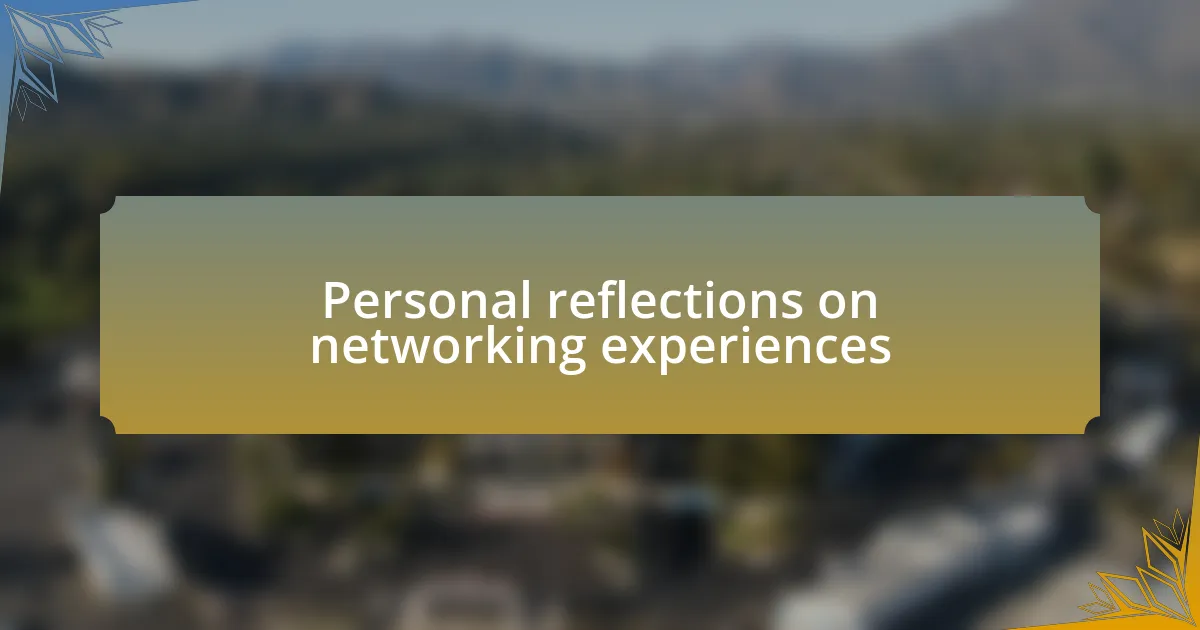
Personal reflections on networking experiences
I often find that the most memorable networking experiences happen in the most unexpected moments. At one conference, I stepped outside for a breath of fresh air and struck up a conversation with an attendee who happened to be waiting for the same presentation. We began sharing stories about our careers, and what started as a casual chat turned into a deep discussion about industry challenges. Have you ever had a spontaneous connection that felt like it was meant to be?
Reflecting on past events, I realize that genuine curiosity plays a vital role in networking. During a breakout session, I approached a panelist afterward to ask a question about their approach to customer feedback. Their enthusiasm for the subject was infectious, and before I knew it, we were discussing our respective strategies at length. That encounter grew from a simple inquiry to a valuable mentorship. It’s amazing how a simple question can open doors to profound insights.
Looking back, one of my most impactful networking moments came when I volunteered at a conference. Not only did I meet various attendees, but I also connected with speakers on a more personal level. I remember helping a keynote speaker with their presentation setup, and afterward, we chatted about their experience. That sincere bonding moment transformed my perspective on networking—it’s not just about exchanging business cards; it’s about creating authentic connections that can last beyond the event. Have you considered the lasting relationships waiting to be formed by stepping outside your comfort zone?